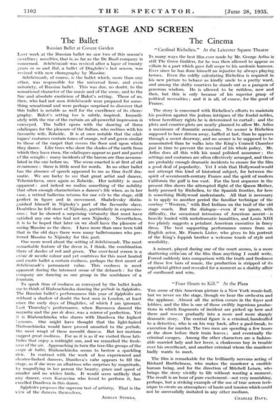"Cardinal Richelieu." At the Leicester Square Theatre IN many ways
the best film ever made by Mr. George Arliss is still The Green Goddess, for he was then allowed to appear as villain in a part which gave full scope to his sardonic humour. Ever since he has done himself an injustice by always playing heroes. Even the coldly calculating Richelieu is required in his new picture to behave as kindly uncle to a pretty ward, and among the shifty courtiers he stands out as a paragon of generous wisdom. He is allowed to be ruthless, now and then, but this is only because of his superior grasp of political necessities ; and it is all, of course, for the good of France.
The story is concerned with Richelieu's efforts to maintain his position against the jealous intrigues of the feudal nobles, whose hereditary rights he is determined to curtail ; and the plots and counter-plots are neatly planned to allow Mr. Arliss a maximum of dramatic occasions. No sooner is Richelieu supposed to have driven away, baffled at last, than he appears through a secret doorway, and no sooner is he supposed to be assassinated than he walks into the King's Council Chamber just in time to prevent the reversal of his whole policy. Mr. Arliss does all this with his usual polished assurance ; the settings and costumes arc often effectively arranged, and there are probably enough dramatic incidents to ensure for the film a good deal of popularity. Yet I wish that Hollywood would not attempt this kind of historical subject, for between the spirit of seventeenth-century France and the spirit of modern California the gulf is too vast. Far the best sequence in the present film shows the attempted flight of the Queen Mother, hotly pursued by Richelieu, to the Spanish frontier, for here is something Hollywood understands. All that is necessary is to apply to another period the familiar technique of the cowboy " Western," with Red Indians on the trail of the old stage coach. But the dialogue—even if we ignore, with difficulty, the occasional intrusions of American accent—is heavily loaded with melodramatic banalities, and Louis XIII too plainly suggests a petulant American executive in fancy dress. The best supporting performance comes from an English actor, Mr. Francis Lister, who gives to his portrait of the King's foppish brother a welcome touch of style and sensibility.
A minuet, played during one of the court scenes, is a more shattering criticism of the film than anything I could write. Forced suddenly into comparison with the truth and freshness of these few bars of music, the production is stripped of its superficial glitter and revealed for a moment as a shabby affair of cardboard and wire.
" Four Hours to Kill." At the Plaza TIIE scene of this American picture is a New York music-hall, but we never see the stage, though we hear the orchestra and the applause. Almost all the action occurs in the foyer and lobbies, and the film is one of those swiftly ingenious produc- tions in which fragments of incident are picked up here and there and woven gradually into a more and more sharply dramatic story. The central figure is a criminal, handcuffed to a detective, who is on his way back, after a gaol-break, to execution for murder. The two men are spending a few hours at the show before their train leaves ; and eventually the criminal escapes. Among the other characters are a fashion- able married lady and her lover, a cloakroom boy in trouble over his sweetheart, and another criminal whom the murderer badly wants to meet.
The film is remarkable for the brilliantly nervous acting of Richard Barthelmess, who makes the murderer a credible human being, and for the direction of Mitchell Leisen, who brings the story vividly to life without wasting a moment. The result is an hour of pure excitementnot very nourishing, perhaps, but a striking example of the use of true screen tech- nique to create an atmosphere of haste and tension which could not be successfully imitated in any other medium.
CHARLES DAVY.






































 Previous page
Previous page